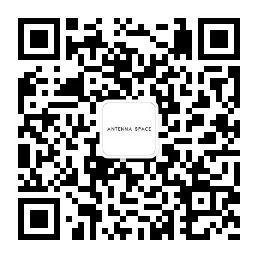November 9, 2023 – November 12, 2023
Shanghai Exhibition Center
Booth No. W22
ART021 Shanghai Contemporary Art Fair 2023

Antenna Space is pleased to announce our participation in the 2023 edition of ART021 Shanghai Contemporary Art Fair. At booth W22, we will present the works of artists Cui Jie, Owen Fu, Guan Xiao, Hongyan, Li Ming, Evelyn Taocheng Wang, Tara Walters, Yu Honglei, and Zhou Siwei.
In the oscillating rhythm of life, akin to a Newton’s cradle, artist Cui Jie finds inspiration to revisit and scrutinize the collective existence and physical boundaries. Through her sketches on grid paper, she appears to mimic the creation of moiré patterns and fingerprints in her artwork. This process serves as a reflection on the influence of electronic media, information flow, and signals on urban planning and architectural design, as well as the resilience of social interactions and relationships. Her works on paper reveal the impact of the era’s collectivist ideology on architecture and familial structures in both public and private spheres. Whether it’s a cinema or a public sculpture, they present a utopian vision of family life within the context of industrial collectivism. This is metaphorically akin to a moiré—a recurring existence that subtly underlies our reality, not always visible or clear. In resonance with this theme, Silver End Village, 2021, and Ground Invading Figure #52, 2022, explore the transformation of individual behaviors influenced by societal backdrops and typical utopian community-building scenes from memory. They achieve this by visually blurring the boundaries between beings and objects.
In her palette paintings, Guan Xiao continues her exploration of duality and breaks down the basic elements of painting to expand her understanding of the medium. She returns to the shape of the artist’s palette and further abstracts it by increasing its scale and puncturing holes in its surface. She uses a poly-putty base to simulate brushstrokes, and she emphasizes the fluidity of paint and patterns, textures, and marks that result from each stroke and each pause during the process of its creation. The rippled texture along the concave-convex surface and the contrasting qualities in light and color showcase the influence of Impressionist techniques that Guan Xiao is further developing further with.
Hongyan’s artwork captures the nuanced intricacies of life. Feel at Ease, 2022, suggests a tranquil scene: lying on a mountainside, gazing at the moon in the night sky, or perhaps standing barefoot on a grassy riverbank, watching the moon’s reflection dance on the water’s surface. This ineffable yet serene state of existence permeates all her works, with dream-like colors and brushstrokes providing a canvas for meditation and contemplation. The presence of human beings in her work is depicted as a state of freedom. Those with visible forms seem to have their thoughts drifting in the wind, while those unseen are portrayed engaging in delicate tasks, such as transferring fish from the water or observing a snail’s journey across a window. The term “at ease” in Hongyan’s paintings does not merely depict a scene of relaxation and contentment. It often carries an ethereal quality, much like her creations themselves. The concepts of dasein and svabhāva are also relevant in this context, suggesting an accidental intertwining of multiple spaces that truly “manifest.”
Pingheng shu benben kun 平衡术笨笨坤, referred to as B.B.K., is a popular folk artist on the video platform Kuaishou, boasting apporximately 2 million 400 thousand followers and receiving almost 40 thousand likes. In 2018, Li Ming observed that B.B.K.’s daily videos, which showcased objects in delicate balance, bore a striking resemblance to the ‘Quiet Afternoon’ series by artist duo Peter Fischli and David Weiss. Intrigued, Li Ming reached out to B.B.K., only to discover that he was unaware of Fischli and Weiss. B.B.K., a native of Henan born in the 1970s, had previously worked as a welder. His fascination with the equilibrium between objects, a passion that began in his childhood, inspired him to start this series. From Li Ming’s perspective, B.B.K. and the artist duo Peter Fischli & David Weiss are like two parallel lines, unaware of each other’s existence. However, due to the universal force of gravity, these seemingly parallel paths have converged in a fascinating intersection of art.
Owen Fu‘s artwork You are my Destiny, 2023, carries a Chinese title that translates to “the fate from generations to generations,” echoing a poem by Ji Yun from the Qing Dynasty. The painting is imbued with a sense of tragedy and romance. Its pitch-black background and dim candlelight evoke feelings of bitterness and degradation. A halo in the upper right corner could represent the watchful eyes of a hidden beast or an encroaching abyss, symbolizing a black hole of desires. Quoting lines from Macbeth, “Out. Out, brief candle. Life’s but a walking shadow. A poor player that struts and frets his hour upon the stage and then is heard no more,” is similar to the flickering flame of a fire, reflecting the characters crafted by the artist. This lends the title an air of irony and mockery, similar to karma. In this piece, Owen returns to their home country, reuniting with their parents after a prolonged separation, and reengages in family life. Owen portrays their father and mother from a third-person perspective, capturing the sense of detachment that many can relate to—the familiar yet sometimes irksome intimacy among family members. Throughout the painting, you can spot moles and traces of life’s trivialities, to some extent, akin to residue ash. Simultaneously, these symbols represent the afflictive thoughts found in Buddhism. Beneath the thin layers of oil and simple lines lie intricate thoughts and emotions. Scenes of life multiply, giving birth to various “appearances.”

Inspired by her teachers, artist Laura Owens and critic Bruce Hainley, Tara Walters blends paint with the water of the Pacific Ocean. This practice is reminiscent of 1950s action painters like Helen Frankenthaler, but relatively new to Walters as a defense against fire (especially the wildfire in LA), and the force it represented and implied. Tara Walters’ paintings have a dreamlike quality that may be related to her tendency for bright colors to punctuate lovely flora and fauna, and natural landscapes too. The rebellion of utilizing unprimed canvases allows the softness and gentleness to saturate the canvas and then permeate everyone’s mind, creating surrealistic visions. Walters informally refers to this misty and ethereal body of work as her “future-telling paintings,” a gentle visual reminder that images are of the soul and spirit rather than of the earth. By building a gateway to the realm of consciousness, Walters believes that art can, in some moments, give space to place the doubts needed to believe in something intangible and metaphysical.
Evelyn Taocheng Wang’s painting in hanging scroll format on paper, A Summer with Mosquito Coil and Heinemann Tom Cat Chocolate, 2021, presents a dreamy illusion. It depicts a smoke cloud from a mosquito coil rising up, “gently spraying with smoke” like a supernatural creation from classical Chinese literature and animation. This scene unintentionally alludes to ‘Childlike Fun’ Tongqu 童趣, a passage from ‘Six Records of a Floating Life’ Fu sheng liu ji 浮生六記 by the Qing Dynasty writer Shen Fu 沈復. In the painting, the artist’s neighbor’s ginger cat pounces on curtains patterned with pigs, evoking a contemporary Journey to the West. In the winter of 2020, the artist adopted a new family member – a tuxedo cat. Its black and white fur mirrored the blend of dark chocolate and milk, adding another layer to her artistry. The title references ‘Heinemann Tom Cat Chocolate,’ a product from a German chocolate brand. The packaging of Heinemann’s is adorned with playful images of kittens, and the chocolate itself is whimsically shaped like a cat’s tongue. This love for cats, known as ailuromania, is a common thread in literature and art, and it seems Evelyn has not only embraced this sentiment but also carved out her own unique niche within it. The painting vividly captures the cat’s paw, soft yet substantial, rendered with dynamic cun-strokes that embody its strength. It’s a frozen moment in time, where the ‘beast’ shatters the illusion of nothingness with a swift tear.
In Walter Benjamin’s linguistic theory, language serves as a lens, its purpose being to facilitate the expression of spiritual existence. Yu Honglei takes this concept further by transforming all 26 letters of the English alphabet into the letter ‘O’ in the work oooooooooooooooooooooooooo, 2019, yet not confining himself to it. The ‘O’ can represent various phenomena: a beam of light filtering through a crevice, the ripples created by skipping stones on water, or even a punctuation mark. It can be visualized as a perfect circle or a modular component that can be reconfigured into a sculpture or stacked to form a structure. Yu Honglei employs a diverse and open system of symbols to encapsulate the essence of objects. Consequently, the exchange of information transcends conventional boundaries and enters the realm of the abstract.
Zhou Siwei‘s many-layered brushwork is like night rain: The darkness is by no means pitch-black, but is endlessly superposed to form obscurity – it is simply a record of impressionist light and shadow and a recollection of their interdependency. The layered monochromes combine into a galaxy-like medium. In this medium, the sense of distance in space becomes blurred, the perspective is withdrawn, buildings – or more precisely structures – separate themselves from gravity and are levitated and distorted in the diffused density. The layered monochromes combine into a galaxy-like medium. In this medium, the sense of distance in space becomes blurred, the perspective is withdrawn, buildings – or more precisely structures – separate themselves from gravity and are levitated and distorted in the diffused density. The hive and the baijiu kettle lose their structural significance and materiality, instead, become a token, a totem, a stream of information or one could say, a pattern of collective memory. Zhou Siwei uses familiar representations deriving from those distant times to expand their pictorial spaces to the present.

Artworks
-
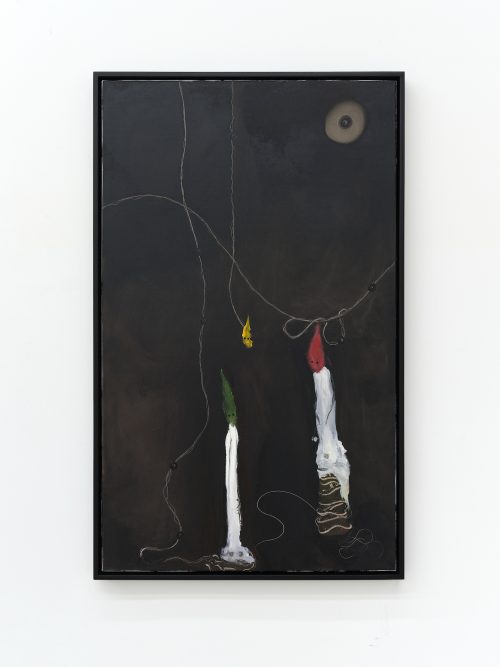
Owen Fu, You are my destiny, 2023
Oil on canvas
150 x 90 cm作品信息Information -
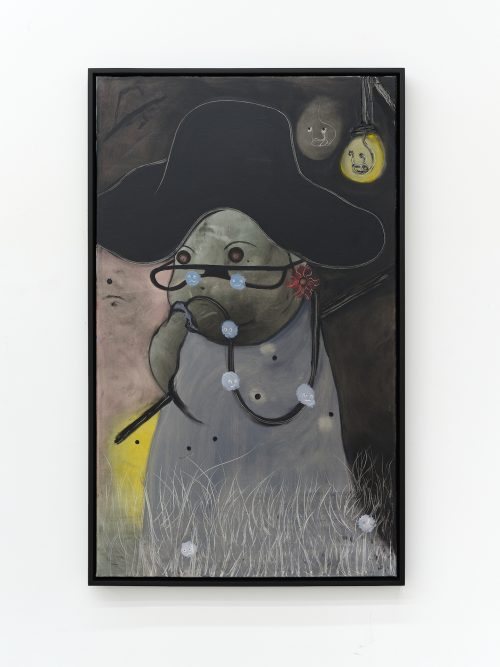
Owen Fu, Shall we talk, 2023
Oil on canvas
150 x 90 cm作品信息Information -
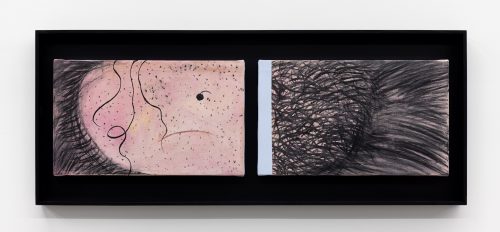
Owen Fu, The suffering of men, 2023
Oil on canvas
30 x 50 x 2 cm / 2 pieces作品信息Information -
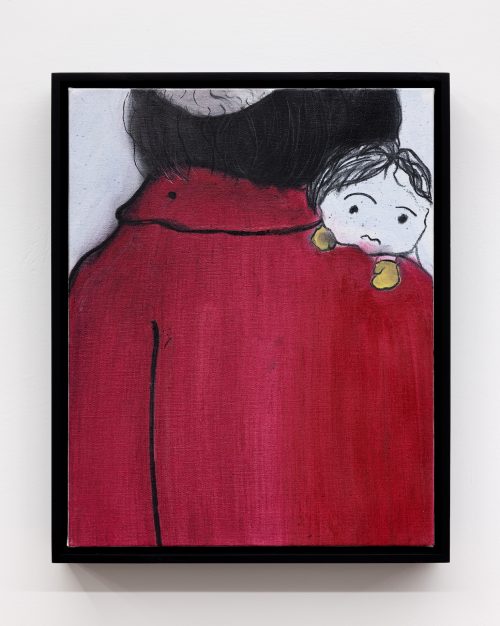
Owen Fu, My Father’s Back, 2023
Oil on canvas
50 x 40 cm作品信息Information -
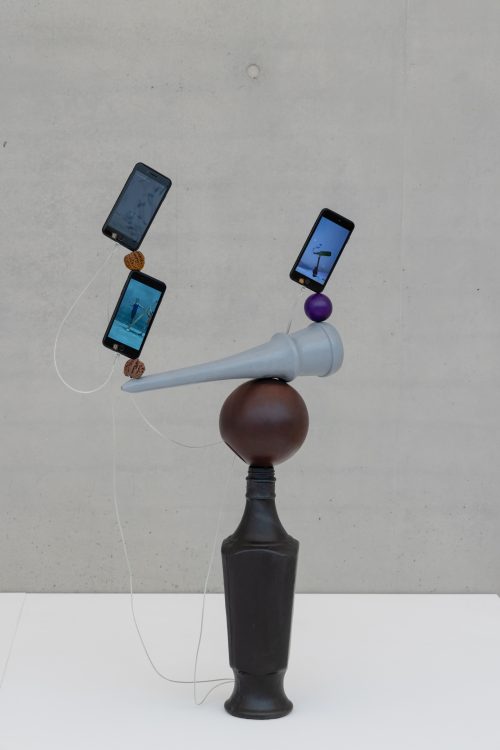
Li Ming, ≠ : “Finally! Parallel lines meet!” #3, 2023
Video, sculpture
Colored brass, iPhone8P作品信息Information -
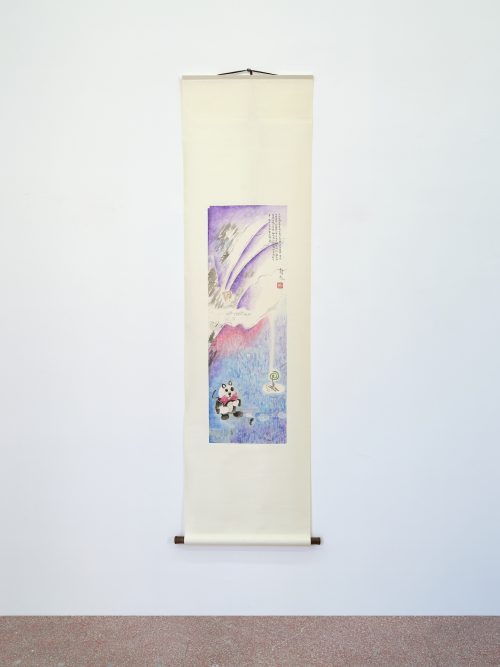
Evelyn Taocheng Wang, A Summer with Mosquito Coil and Heinemann Tom Cat Chocolate, 2021
Ink, mineral color, pencil, acrylic, paper glued on paper
102 x 34.5 cm作品信息Information -
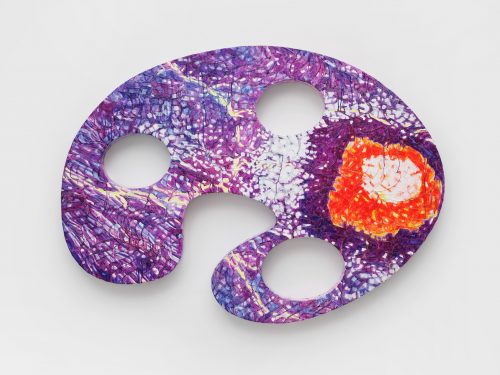
Guan Xiao, Velvet, Oedo, Lily pads in the pond, 2023
Wood panel, poly-putty base, paint
164 (L) x 120 (W) x 7.5 (D) cm作品信息Information -
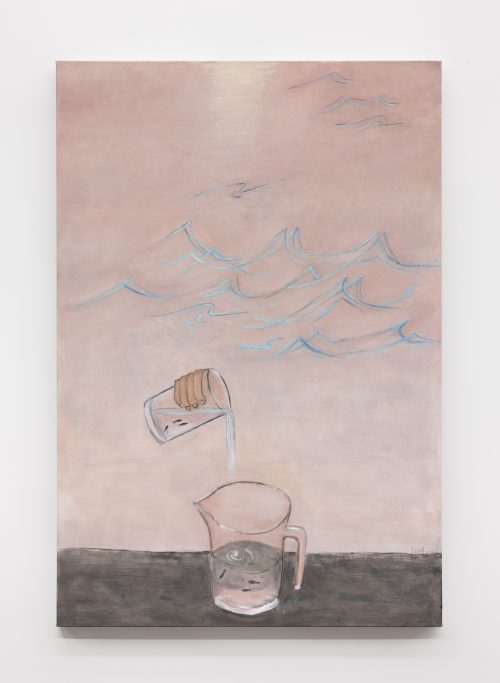
Hongyan, A Balmy Breeze, A Cluster of Waves, 2023
Oil on canvas
110 x 75 cm作品信息Information -
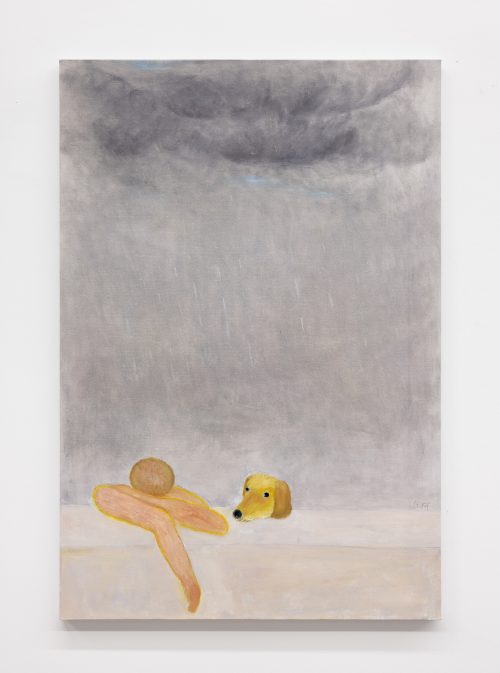
Hongyan, Dear Erkang, 2023
Oil on canvas
110 x 75 cm作品信息Information -
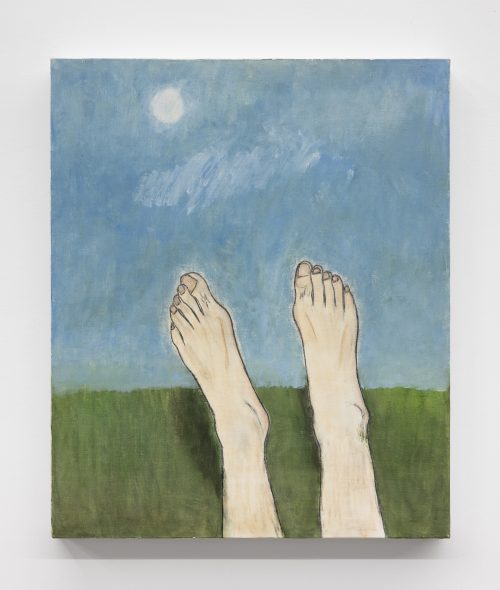
Hongyan, Feel at Ease, 2022
Oil on canvas
60 x 50 cm作品信息Information -
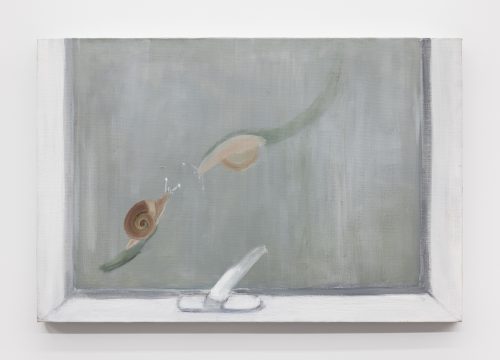
Hongyan, The Little Snail, 2022
Oil on canvas
40 x 60 cm作品信息Information -
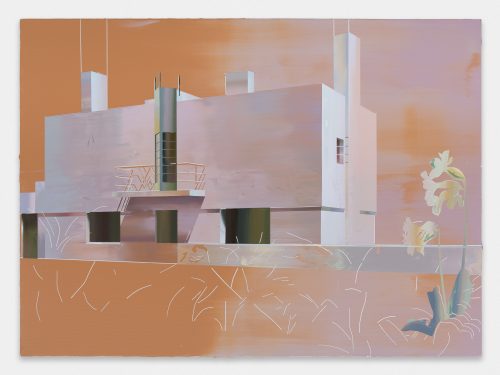
Cui Jie, Silver End Village, 2021
Acrylic on canvas
110 x 150 cm作品信息Information -
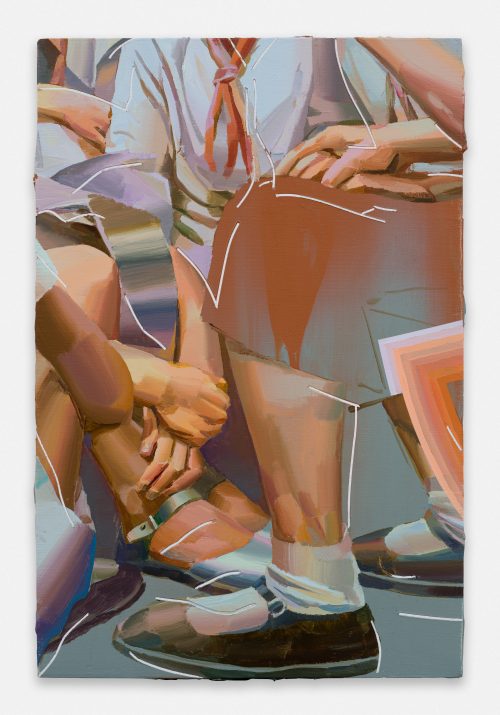
Cui Jie, Ground Invading Figure #52, 2022
Acrylic on canvas
60 x 40 cm作品信息Information -
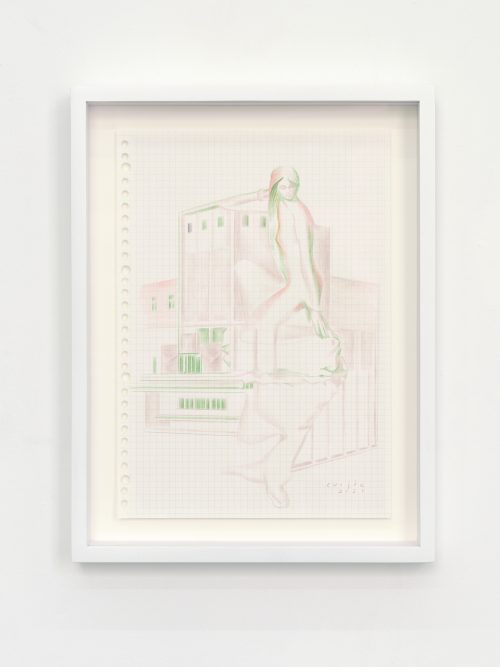
Cui Jie, Caoyang Cinema and Bata Cinema, 2021
Color pencil on paper
29.6 x 21 cm; With frame: 36 x 28 cm作品信息Information -
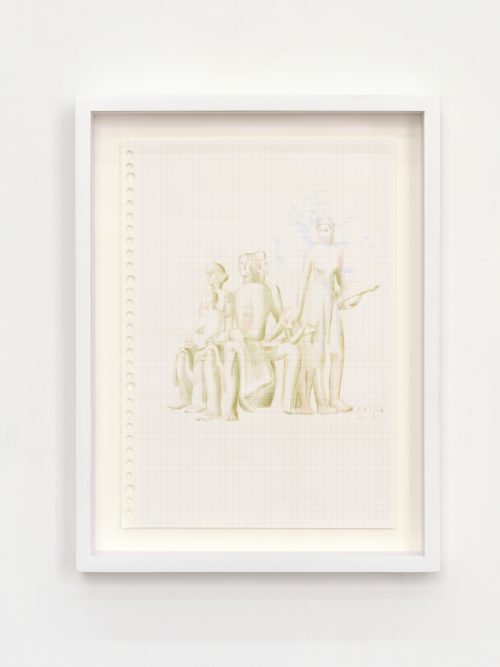
Cui Jie, Happy Family, 2021
Color pencil on paper
29.6 x 21 cm; With frame: 36 x 28 cm作品信息Information -
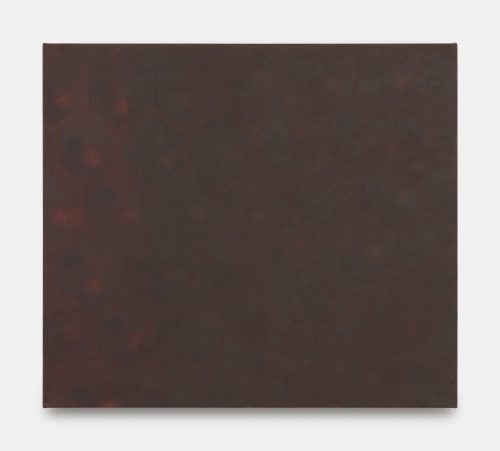
Zhou Siwei, Hive (Yin Yang), 2018
Oil on canvas
70 x 80 cm作品信息Information -
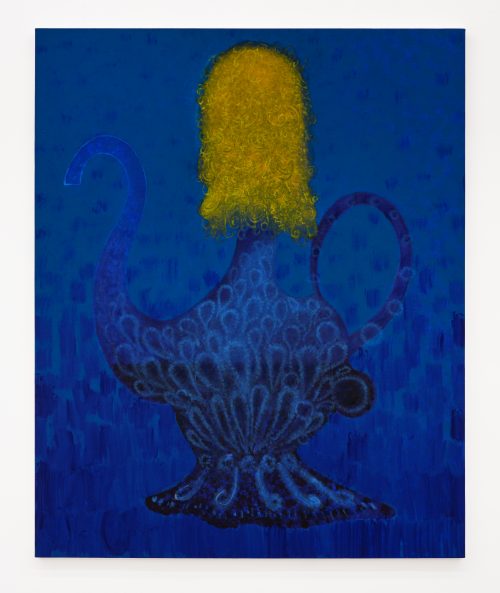
Zhou Siwei, BaiJiu Blonde (Dream Blue) , 2021
Oil on canvas
160 x 130 cm作品信息Information -
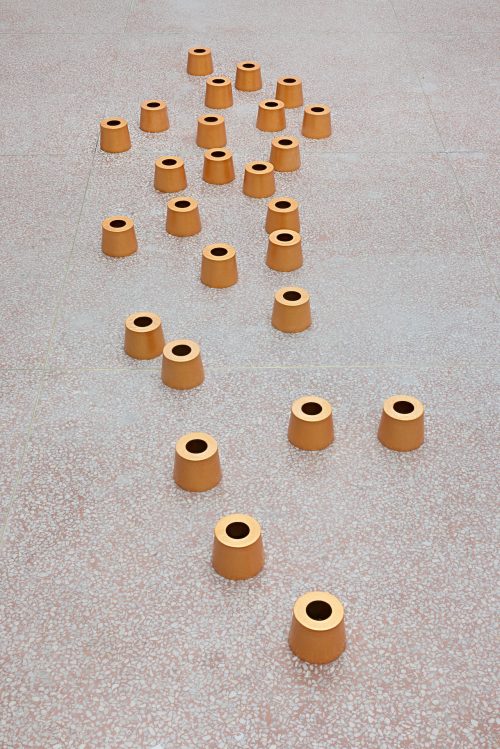
Yu Honglei, oooooooooooooooooooooooooo, 2019
Acrylic on metal
Dimensions Variable,8 × 8 × 12 cm / each作品信息Information -
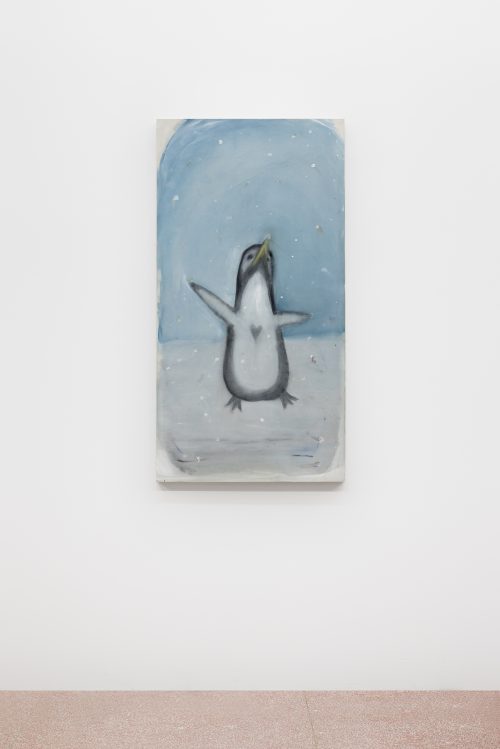
Tara Walters, Penguin, 2022
Water based paint and Pacific Ocean water on muslin
137.16 x 71.12 cm (54 x 28 inches)作品信息Information -
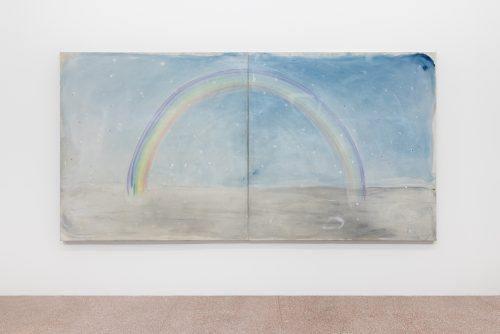
Tara Walters, Snowy Rainbow, 2022
Water based paint and Pacific Ocean water on muslin
183 x 183 cm (72 x 72 inches) / 2 pieces作品信息Information
